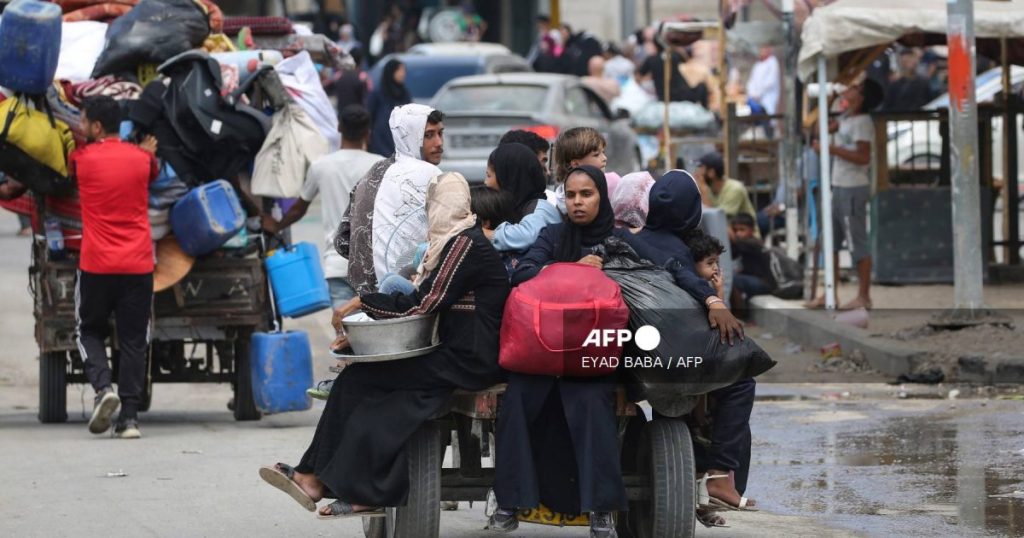
On Friday, Hamas announced its rejection of what it referred to as “new conditions” in a Gaza ceasefire proposal put forward by US-led mediators during talks held in Qatar.
Despite diplomatic efforts, the suffering endured during more than 10 months of war continues unabated, but US President Joe Biden expressed optimism following the recent discussions, stating that “we are closer than we have ever been”.
US Secretary of State Antony Blinken is set to visit Israel this weekend at the behest of Biden to promote the latest proposal, as confirmed by the State Department.
Egyptian, Qatari, and US negotiators have been working on finalizing the details of a framework initially proposed by Biden in May, which he indicated had been suggested by Israel.
In a joint statement, the mediators disclosed that they had presented a proposal to both parties aimed at “bridging remaining gaps”. They pledged to continue working in the days ahead to iron out specific details related to humanitarian provisions and the exchange of hostages and prisoners.
Further discussions to expedite an agreement are scheduled to reconvene in Cairo “before the end of next week”.
Notably, Hamas, which did not participate in the talks in Doha, promptly voiced its opposition to what it perceived as “new conditions” imposed by Israel in the latest plan.
Israeli Prime Minister Benjamin Netanyahu urged the mediators to apply pressure on Hamas to accept Biden’s proposed framework.
The threats made by Iran and its allies to target Israel have heightened the urgency in reaching a ceasefire in Gaza, with the mediators striving to achieve a resolution to avert a broader regional conflict.
“No actions should be taken by any party in the region to undermine this process,” cautioned Biden, later adding, “There are just a few more issues to resolve, and I believe we have a chance.”
– Potential ‘Cataclysmic’ Ramifications –
An anonymous source informed AFP that Hamas raised objections to stipulations concerning the presence of Israeli troops along Gaza’s border with Egypt and conditions related to the release of Palestinian prisoners in exchange for Israeli captives.
Jordan, a key Western ally, squarely blamed Netanyahu for impeding a resolution, with Foreign Minister Ayman Safadi urging all concerned parties to apply pressure “to see this process through to completion”.
British Foreign Secretary David Lammy and his French counterpart Stephane Sejourne met with Israeli officials on Friday to push for progress in the negotiations.
During the discussions, Israeli Foreign Minister Israel Katz highlighted the expectation of international support in the event of any retaliatory actions by Iran following the assassination of Hamas leader Ismail Haniyeh in Tehran.
Sejourne responded that it would be inappropriate to discuss retaliatory measures while diplomatic efforts are actively seeking to prevent such incidents from occurring.
A senior US official, speaking on condition of anonymity, cautioned Iran of potential “cataclysmic” consequences if it were to strike Israel.
An assault by Israeli settlers in the occupied West Bank late on Thursday garnered international condemnation and calls for sanctions, including against government ministers, due to the surge in settler violence against Palestinians since the start of the Gaza conflict.
According to the Israeli military, “dozens of Israeli civilians, some wearing masks”, infiltrated the village of Jit, setting vehicles and structures ablaze, and launching rocks and Molotov cocktails. A Palestinian man was fatally shot.
The Palestinian foreign ministry based in the West Bank labeled the incident as “organized state terrorism”.
The EU’s top diplomat, Josep Borrell, declared intentions to propose sanctions against Israeli government officials facilitating Jewish settler violence.
Israeli Finance Minister Bezalel Smotrich, known for his far-right views in support of West Bank settlements, swiftly joined other Israeli leaders in denouncing Thursday’s attack by “criminals”.
– First Case of Polio Reported –
The war triggered by Hamas on October 7 inflicted a death toll of 1,198 individuals, primarily civilians, as per an AFP tally based on Israeli official data.
Militants also abducted 251 individuals, with 111 still held in Gaza, including 39 deemed deceased by the military. Over 100 were liberated during a temporary ceasefire in November.
By Thursday, the toll from Israel’s retaliatory military operations surpassed 40,000, according to the health ministry in Gaza under Hamas administration, which did not provide a breakdown of civilian versus militant casualties.
The conflict has ravaged the healthcare infrastructure in the besieged territory, prompting repeated warnings from the World Health Organization regarding the risk of preventable diseases.
The Palestinian health ministry reported on Friday the diagnosis of a 10-month-old unvaccinated child in Gaza with polio, marking the territory’s first case in 25 years, according to the WHO.
This revelation coincided with UN chief Antonio Guterres’ call for two week-long ceasefires in the Gaza conflict to vaccinate over 640,000 children against the type 2 poliovirus, initially detected in the territory’s sewage in June.
Meanwhile, as ceasefire negotiations progressed, thousands of civilians within the Palestinian territory were once again displaced following new evacuation orders issued by the Israeli military in anticipation of imminent military actions.
The UN estimated that over 170,000 individuals are affected by the evacuation orders, compelling them to seek refuge in the diminishing safe zone designated for humanitarian purposes.
The allocated relocation area represents a mere 11 percent of Gaza, as reported by the UN.
“With every round of negotiations, they apply pressure through evacuations and perpetrate massacres,” remarked Issa Murad, a displaced Palestinian now residing in Deir al-Balah, regarding the actions of the Israeli forces.
AFP
